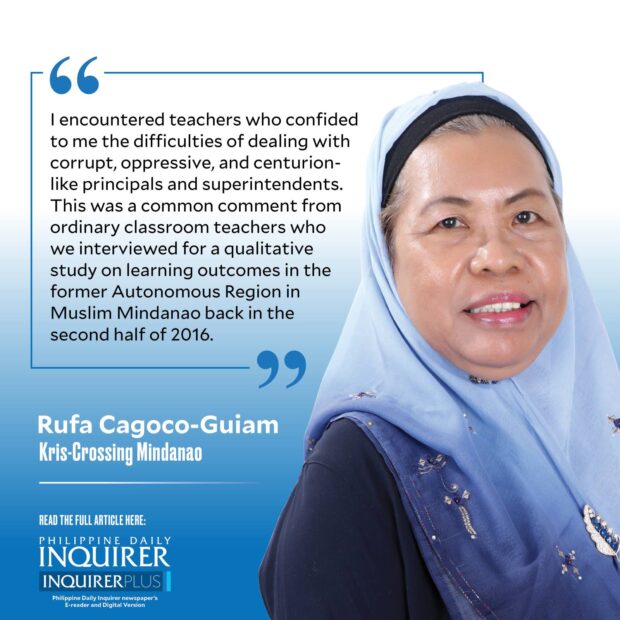
It is also equally challenging to teach in urban areas where schools are cramped and do not have adequate facilities to ensure a conducive environment for teaching and learning. Even institutions of higher learning, especially among some state universities and colleges are not exempt from having this type of situation in their respective campuses.
Before retirement, I used to teach classes of 45 students but the room assigned to me only had chairs for 35. The remaining 10 students sat outside the classroom, with their chairs placed right next to the wall so they could hear my lectures. In addition, the building was quite old, built when the university population was still small. The window panes were made of wood, which had seen better days, and were quite dusty every day, given the savanna-kind of environment we have in dry and arid General Santos City. The ceilings were quite low, fitted with aged rotary ceiling fans that many times did not work; when they did, it made scary sounds like they were about to give way to old age. One of my most threatening sources of anxiety while teaching at that time was—what if the ceiling fan breaks, and the propellers scatter all over, and one of those decapitates me? The thought of dying through decapitation by an ancient ceiling fan propeller was enough to scare the wits out of me then; so more often than not, I told my students not to switch it on.
School administrators cite the usual reason for inadequate funding for the schools’ maintenance and other operational costs (MOOEs) for not providing ample facilities. This is why many public school principals have resorted to extracting money from cash-strapped parents in the form of “voluntary” contributions to the schools’ parents-teachers-community-associations (PTCAs). If parents of the pupils refuse to contribute (the amount ranges from P600 to P1,000 for every student) there is a possibility their children will face some inordinate forms of punishment, like being disregarded as a potential honor student. Another is not to get a passing grade for values education or related subjects.
But perhaps the worst environment for teachers and students is in schools led by avaricious and oppressive school administrators who act like they are the present-day equivalent of ancient Roman centurions or the Spanish colonizers’ guardia sibil.
On Teachers’ Day last week, Albay Rep. Edcel Lagman exhorted Vice President Sara Duterte, concurrently the Department of Education (DepEd) secretary, to “act as a teacher, not as a centurion.” He noted that the DepEd should be headed by an educator, and not someone who acts like the ancient Roman centurion. Lagman’s remark was a retort to the pronouncements of Duterte during her speeches on the same day when she made a very strong stand to defend her “request” of getting P500 million and an additional P150 million as confidential and intelligence funds (CIFs) for the two offices she heads. The gist of her defense of the CIFs is this rather fallacious argument that those who are against the release of CIFs for her offices have “insidious motivations” and that those who are against it are against peace, and therefore they are also among the enemies of the country (“Ang kumokontra ng confidential funds ay kumokontra ng kapayapaan; ang kumokontra ng kapayapaan ay kalaban ng bayan.” (I leave this to philosophy professors to debate on the type of fallacy committed here).
But even before Duterte was appointed DepEd secretary, I already encountered teachers who confided to me how difficult it was dealing with corrupt, oppressive, and centurion-like principals and superintendents. This was a common comment from ordinary classroom teachers who we interviewed for a qualitative study on learning outcomes in the former Autonomous Region in Muslim Mindanao back in the second half of 2016.
This is the type of educational environment the DepEd honcho wants to perpetuate if Congress finally grants the CIFs for her two offices.
—————
Comments to rcguiam@gmail.com

